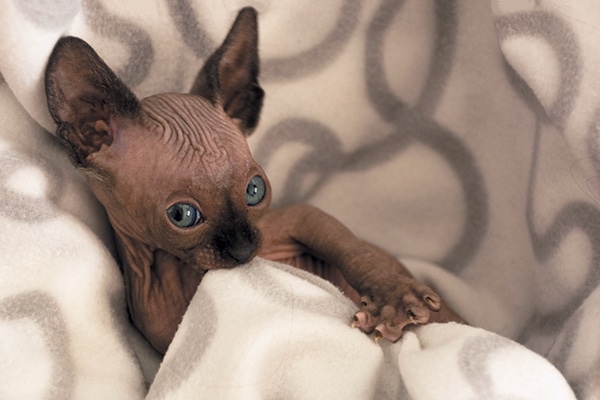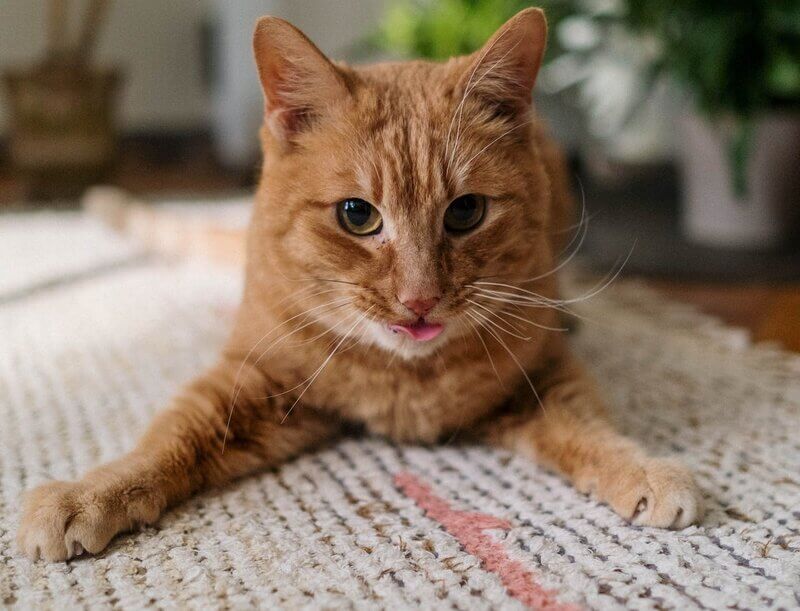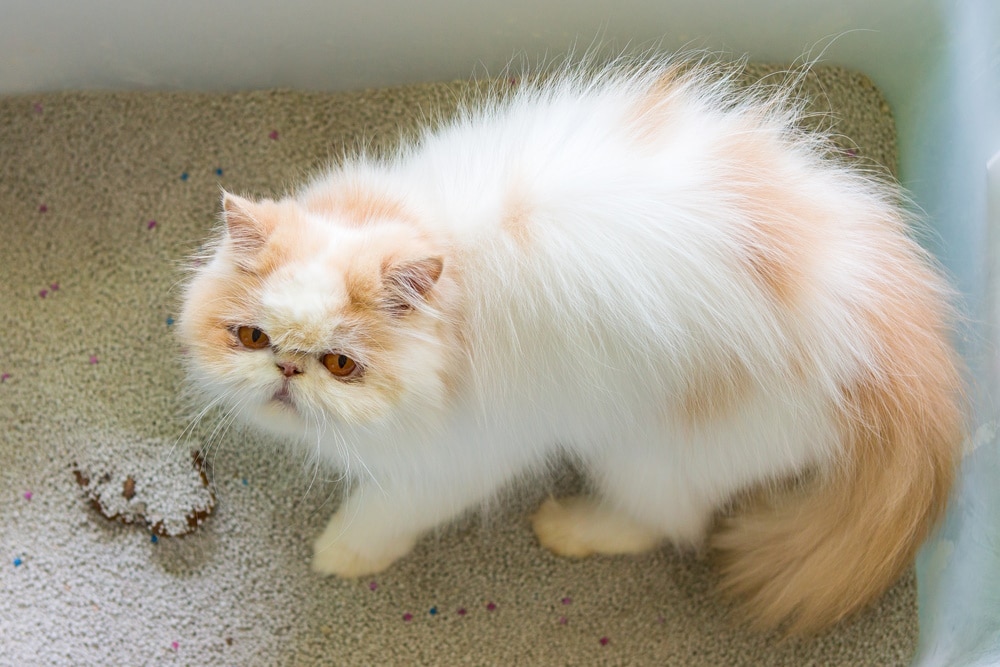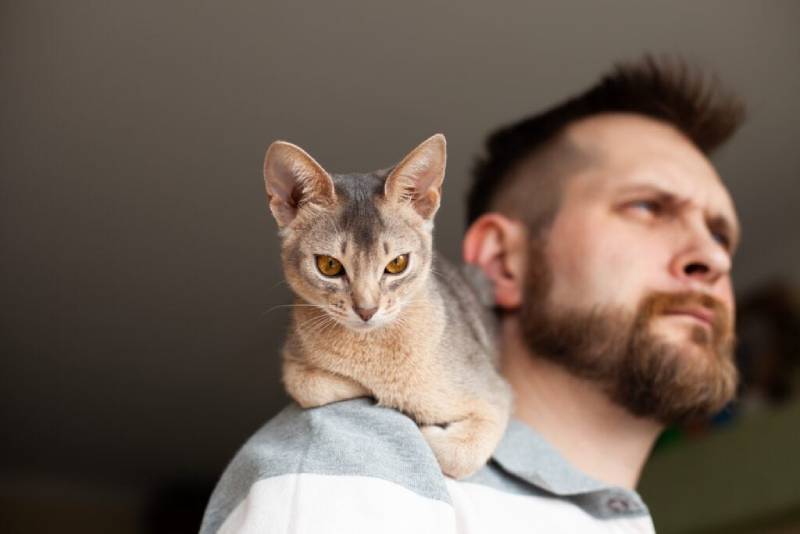If you’ve brought a new kitten into your home, you might have noticed your kitty sometimes engages in what can seem like odd behavior. Whether it’s crazy cat time or a penchant for trying to eat their tail, kittens (and cats of all ages) can exhibit some interesting and often hilarious actions! One behavior in particular you may have seen your kitten doing is suckling.
Kitten suckling can occur when a cat sucks on a blanket, toy, a person’s fingers, or even a part of their own body. But is this behavior something you should be concerned about? Why is your kitten suckling in the first place?
There are several reasons kittens suckle, which we’ll look at below! We’ll also answer a few cat owners’ most common questions about kitten suckling.
What Is Kitten Suckling?
Kitten suckling is simply the term for when your kitten starts sucking on something. This could be a blanket, toy, or part of a person’s body, such as fingers or skin tags. A kitten might even suck on a part of their own body, like their tail. Often, this suckling may be accompanied by kneading and much purring.
Overall, kitten suckling typically isn’t something to be concerned with, as most kittens will exhibit this behavior at some point. But there are a few instances where there could be cause for concern. So, why do kittens suckle on items?
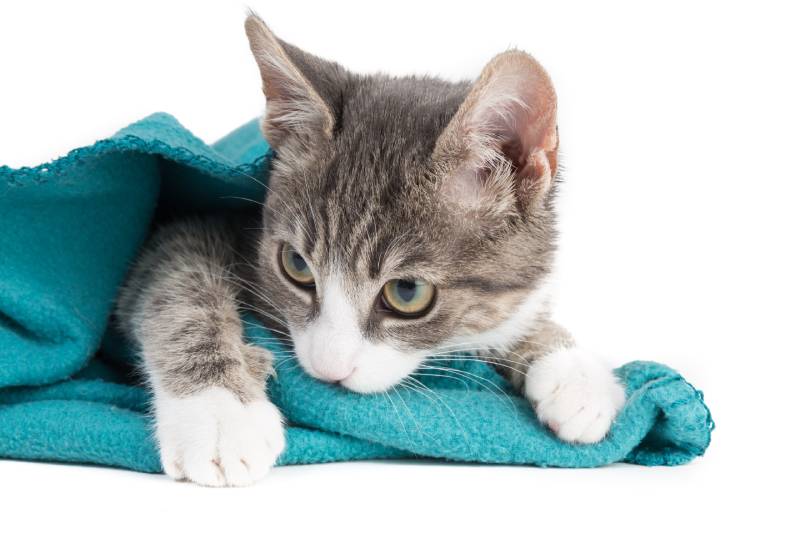
Why Do Kittens Suckle?
Kittens might suckle on something for several reasons, including themselves, you, or household items. Here are some of the most common reasons why a kitten is suckling.
1. Weaned Too Early
Did you save your kitten from the side of the road or somewhere similar? Were they especially tiny when you found them? Then, your kitten might have been weaned too early from mama cat’s milk, which could be why they’re suckling now. Kitties weaned before eight weeks may start suckling on items because they are seeking a replacement for mama cat’s milk.
Unfortunately, a kitten being weaned too early can develop behavioral issues, so this instinctual suckling behavior could end up lasting into adulthood. If you believe this is the cause of your kitten’s suckling, it could be worth it to have a conversation with the cat’s vet.
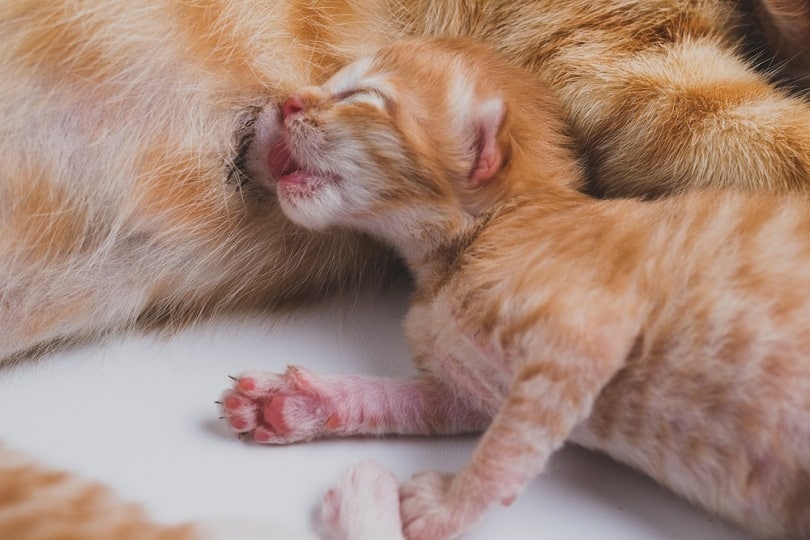
2. Kitty Is Hungry
Your kitten may also be trying to tell you that they are hungry when they engage in suckling. It makes sense that if suckling can be an attempt to replace mama cat’s milk, a kitten would be hungry when they do it. So, if you notice your kitten suckling items more than usual, it could be a sign they aren’t getting enough to eat. Try giving them some extra food to see if that remedies the suckling behavior.
3. Kitty Feels Safe
If your kitten is curled up on you, suckling on your shirt or finger, it could simply be a sign that the cat feels safe at that moment. They’re letting their guard down when doing this rather than being extra alert to their surroundings and trusting that you’ll protect them, so take this as a compliment!
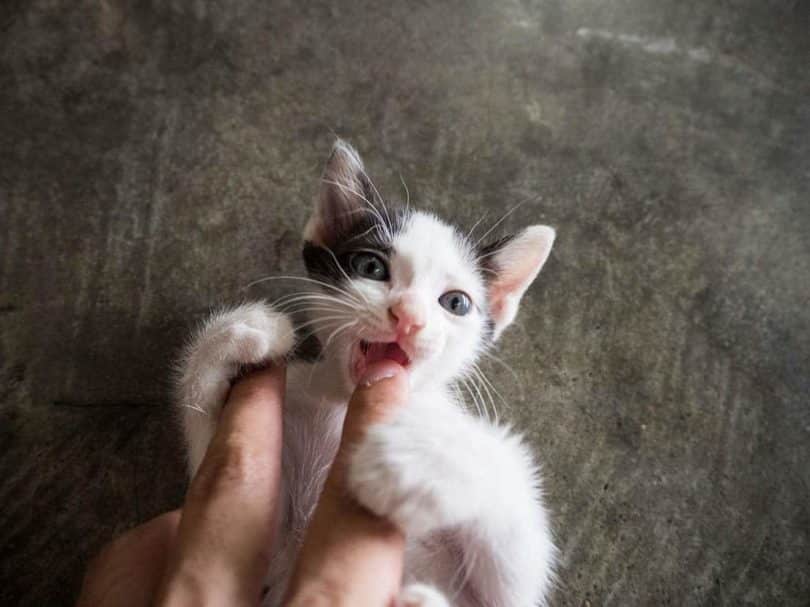
4. Breed-Specific Behavior
Some feline breeds are believed to simply more prone to suckling than others. Compulsive suckling can show up in breeds like the:
5. Self-Soothing
Suckling comes from nursing, which is a natural instinct a kitten has. But suckling isn’t only an instinctual behavior that has to do with getting fed and surviving. Suckling mama cat helps kitty and mama bond, allowing them to feel safe and soothed. So, if your kitten is suckling on you, themselves, or household items, this may be a self-soothing, comforting behavior. Think of it as a child sucking their thumb. If the suckling is self-soothing for your cat, it may last a little longer for them than it would for other cats, but they should eventually grow out of it.
However, it could also be a sign your kitten is feeling stressed and using suckling to soothe that stress. If you believe your kitten might be stressed, a talk with your vet may be in order.
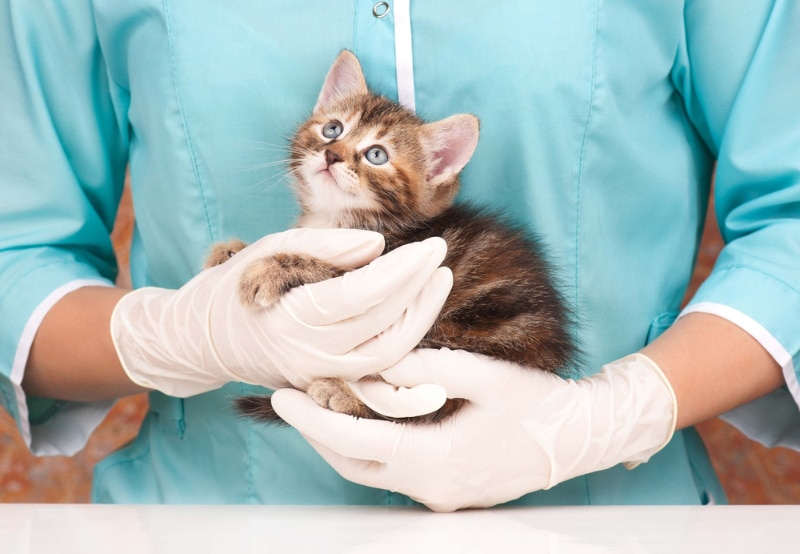
6. Kitty Is Happy
Your kitten may simply be happy and show that happiness through suckling! Much in the way a kitty that feels safe may start suckling on a blanket or something else in a show of letting their guard down, a happy kitten might use suckling to indicate their level of contentment. It’s just a way to express themselves, so it’s nothing to be concerned about.
7. Seeking Attention
Have you been paying a bit less attention to your kitten as of late than you normally do? If you have and your kitten has started suckling on your clothing or parts of your body, they may be trying to get your attention back on them. Kitties can be needy (despite the stereotype of cats being aloof), so make sure you’re giving your kitten all the love and attention they crave!
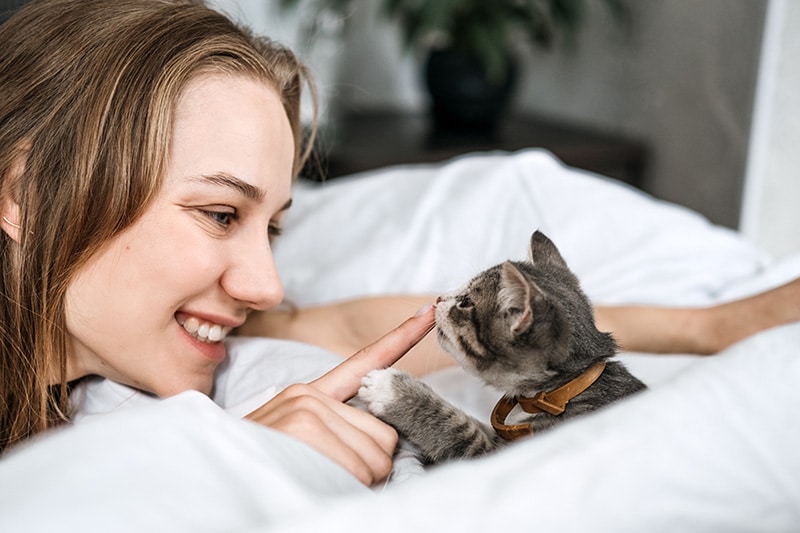
Frequent Asked Questions
Of course, you might have more questions about kitten suckling behavior, so here are answers to some of the most frequently asked questions!
How do I curb my kitten’s suckling behavior?
If it seems as if your kitten is suckling on items a little too often, you can help them in a few ways. The first is by ensuring they are getting plenty of attention, playtime, and love. The next is by trying to redirect their attention from suckling to something like a toy or food puzzle that will keep them mentally stimulated. Finally, if you believe the cause of the suckling is health-related, take the kitten in for a check-up! But remember that a kitten suckling is usually perfectly normal and nothing to be concerned about.
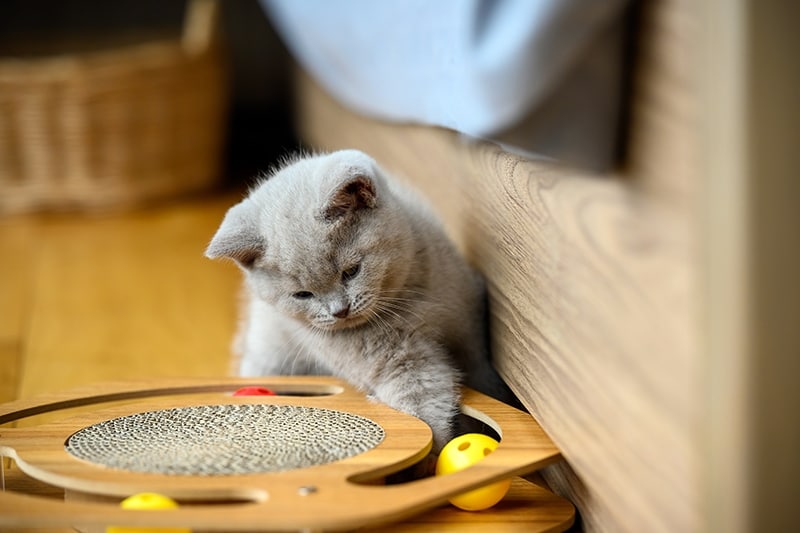
Is there any danger to a kitten suckling?
The main danger of a kitten suckling on items is the risk of loose threads, fringe, or other embellishments they might end up swallowing, which could result in an intestinal blockage. If your cat is suckling on blankets, clothing, or similar items, make sure there isn’t anything loose on them.
When should a kitten grow out of suckling?
It’s different for every kitten, of course, but most kittens will start growing out of suckling behavior as they begin to eat solid foods. The more comfortable they become in your home, the less they should engage in this behavior, as well. Some cats, however, will continue to exhibit the behavior into adulthood.
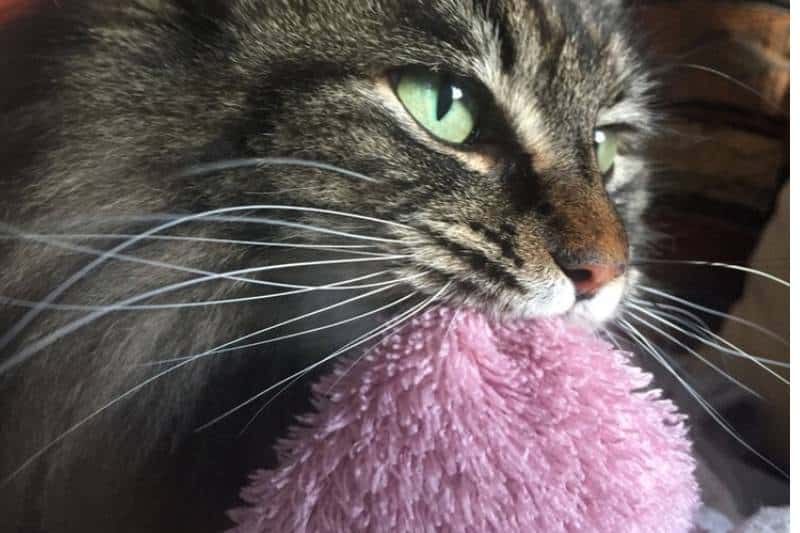
Conclusion
Many kittens engage in suckling behavior, and, for the most part, it is normal. However, there are a few instances where kitten suckling may indicate something is wrong with the kitten, such as a health issue or your pet feeling stressed. Watch them for any other signs that could indicate they are feeling unwell or are unhappy. If you don’t see negative signs accompanying the suckling, your kitty is probably fine and just feeling happy, content, or safe (or possibly hungry).
See also:
- Why Do Cats Suck on Blankets? 5 Vet Reviewed Reasons & Solutions
- The Catsifier: A Pillow With Nipples for Kitties Who Suckle: Review
Featured Image Credit: ElenaBoronina, Shutterstock
Contents
- What Is Kitten Suckling?
- Why Do Kittens Suckle?
- 1. Weaned Too Early
- 2. Kitty Is Hungry
- 3. Kitty Feels Safe
- 4. Breed-Specific Behavior
- 5. Self-Soothing
- 6. Kitty Is Happy
- 7. Seeking Attention
- Frequent Asked Questions
- How do I curb my kitten’s suckling behavior?
- Is there any danger to a kitten suckling?
- When should a kitten grow out of suckling?
- Conclusion

